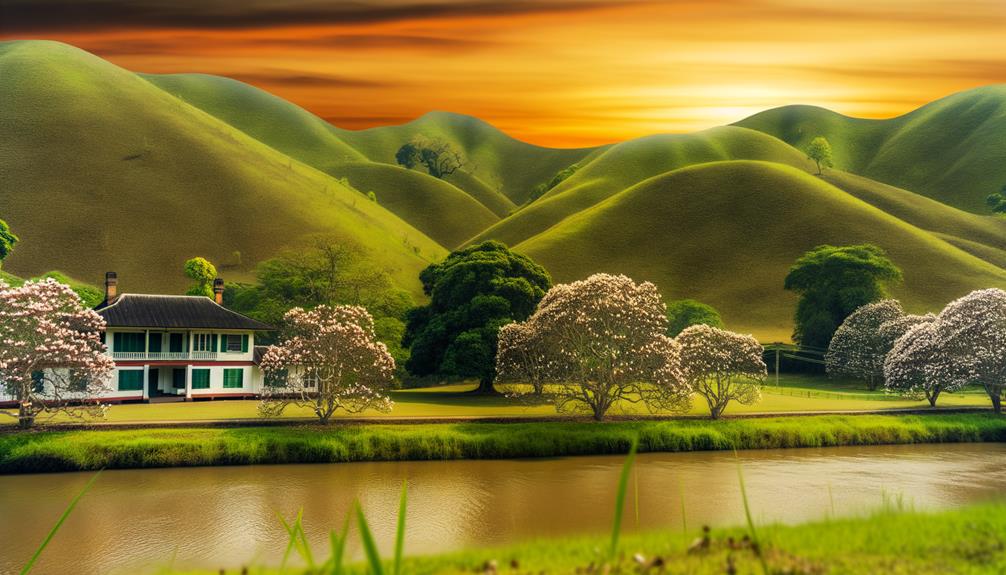Meaning of the Name Virginia
The name Virginia originates from the Latin 'Virgo,' signifying 'virgin.' This designation honored Queen Elizabeth I, famously known as the 'Virgin Queen,' and was bestowed by Sir Walter Raleigh and early colonists. Established in the late 16th century, the name symbolizes purity and maidenhood, aligning with Elizabeth I's persona.
Throughout history, it has been borne by notable figures such as Virginia Woolf and Virginia Dare, encompassing significant cultural, social, and literary dimensions. Understanding the deeper historical and cultural context of the name reveals its lasting influence on American heritage and beyond.

Key Takeaways
- The name Virginia is derived from the Latin word 'Virgo,' meaning 'virgin.'
- It was named in honor of Queen Elizabeth I, known as the 'Virgin Queen.'
- Virginia symbolizes purity and maidenhood, aligning with Elizabeth I's representation.
- The name has cultural significance, associated with exploration, resilience, and an intellectual legacy.
- Virginia has been borne by notable figures like writer Virginia Woolf and early settler Virginia Dare.
Historical Background
The name Virginia has its origins rooted in the early colonial history of the United States, specifically linked to the Virginia Colony established by the English in the 1600s. This colony was one of the first permanent English settlements in North America, founded in 1607 at Jamestown.
It played a pivotal role in the expansion of English influence in the New World, serving as a blueprint for subsequent colonial endeavors. The name Virginia itself became synonymous with the expansionist and imperial aspirations of the English Crown, reflecting a period of exploration, settlement, and establishment of governance.
The colony's success laid the groundwork for future American development, making Virginia a significant historical reference point in the broader narrative of U.S. history.
Etymology and Origins
Tracing its linguistic roots, the name Virginia derives from the Latin word 'Virgo,' meaning 'virgin,' in honor of Queen Elizabeth I, who was known as the 'Virgin Queen.' This designation was bestowed upon the region by Sir Walter Raleigh and the early English colonists, reflecting their reverence for the monarch.
The use of 'Virginia' dates back to the late 16th century, marking it as one of the earliest colonial place names in America. Etymologically, the name also signifies purity and maidenhood, aligning with the symbolic representation of Elizabeth I.
Over time, 'Virginia' has evolved from a term of royal homage to a widely recognized personal name and geographical identifier, rooted deeply in both historical and cultural contexts.
Cultural Significance
Virginia's cultural importance extends beyond its etymological roots, encompassing a rich tapestry of historical, social, and literary dimensions.
Historically, the name is synonymous with the early colonial era in America, particularly through the establishment of the Virginia Colony, the first permanent English settlement in the New World.
Socially, the name Virginia has been borne by influential figures, like Virginia Woolf, whose literary contributions have left an indelible mark on modernist literature. Additionally, Virginia Dare, the first English child born in the Americas, symbolizes the pioneering spirit and challenges of early settlers.
The name continues to resonate within cultural narratives, serving as a symbol of exploration, resilience, and intellectual legacy. This multifaceted significance underscores Virginia's enduring impact on cultural history.
Popularity Over Time
Over the centuries, the name Virginia has experienced fluctuating waves of popularity, reflecting broader sociocultural trends and historical events. Its peak in the early 20th century can be attributed to a combination of literary influences and the allure of classical names during that period.
However, the name's usage saw a decline in the latter half of the century, as modern and more eclectic names gained favor. The resurgence in recent decades aligns with a revived interest in traditional and vintage names.
Statistical data from the Social Security Administration illustrates these trends, showing significant variations in the name's ranking over time. Therefore, the name Virginia's popularity is emblematic of shifting cultural currents and the evolving landscape of naming conventions.
Famous Namesakes
The enduring legacy of the name Virginia is further highlighted by a notable list of famous namesakes who have left their mark across various fields. Renowned British author Virginia Woolf stands as a literary giant, her works profoundly influencing modernist literature.
In the world of entertainment, actress Virginia Madsen has garnered acclaim for her versatile roles in film and television. Virginia Dare, the first English child born in the Americas, symbolizes early colonial history and the mysteries of the Lost Colony.
Additionally, Virginia Apgar revolutionized neonatology with the Apgar Score, a critical tool for evaluating newborn health. These distinguished individuals underscore the name Virginia's historical and cultural significance, resonating across generations and disciplines.
Conclusion
The name Virginia, rooted in the Latin 'Virgo' and linked to the notion of purity, has traversed centuries with unwavering relevance. Its historical ties to Queen Elizabeth I and its cultural resonance across literature and politics underscore its enduring appeal.
Like an ancient tree deeply rooted yet continually flourishing, Virginia remains a name of timeless elegance and significance, reflecting a rich tapestry of historical and cultural narratives.






